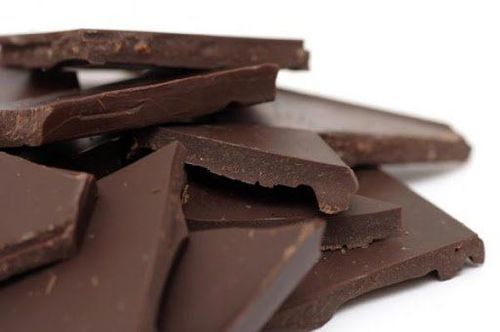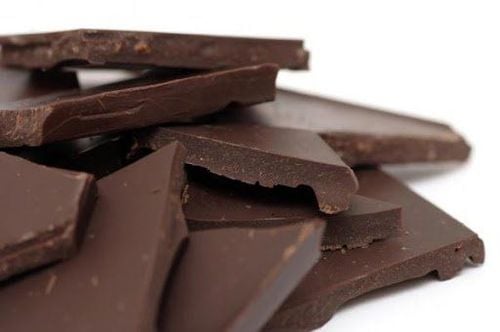This is an automatically translated article.
In addition to effects such as improving heart health, reducing inflammation and boosting brain function, dark chocolate can also aid in weight loss. So how many calories are in 100g of dark chocolate to get this effect?1. How many calories in dark chocolate?
Dark chocolate is considered the healthiest of all chocolates, even recommending dark chocolate as a healthy after-dinner snack. It is estimated that a 1-ounce (28 g) serving of 85% dark chocolate has 136 calories, 14 g of fat, and 1 g of protein. This product is also sugar-free, with 2 grams of fiber and 12 grams of carbohydrates.While you can normally turn to coffee, tea or soda to consume caffeine, chocolate itself has caffeine. This is all thanks to the natural cocoa beans that contain caffeine.
Dark chocolate contains higher levels of cocoa beans, so it may have more caffeine than other types of chocolate. Therefore, if you indulge in beverages and other caffeinated foods during the day, it's a good idea to reduce the amount of dark chocolate you eat or vice versa. Some medications, such as aspirin, also have caffeine.

Socola đen được xem là loại socola lành mạnh nhất trong số các loại socola, thậm chí còn khuyến cáo socola đen như một món ăn lành mạnh sau bữa tối
2. Benefits of the habit of eating dark chocolate
Dark chocolate may help prevent heart disease and reduce the risk of strokeOne of the biggest benefits that researchers say is dark chocolate's role in improving heart health. A meta-analysis of eight studies on the link between chocolate consumption and cardiovascular disease, published in July 2015 in the journal Heart, found that people who ate more chocolate each day had an increased risk of heart disease. lower risk of heart disease and stroke.
Some observational studies also show that enjoying dark chocolate regularly can reduce the risk of heart disease. For example, an earlier study published in the journal Clinical Nutrition found that people who ate dark chocolate more than five times a week had a 57 percent lower risk of heart disease.
According to a study published in the American Journal of Clinical Nutrition, researchers explain the effects above because the flavonoids in dark chocolate help maintain heart health by helping the body produce oxides. nitric, which causes blood vessels to dilate and blood pressure to drop.
Since many of these studies are observational, the results may be biased because participants incorrectly reported their chocolate intake. The limitation of these studies is that they cannot directly establish cause and effect. Therefore, more studies are needed to determine the exact amount and type of flavonoid-rich chocolate that can help reduce the risk of stroke.

Một số nghiên cứu quan sát cũng cho thấy việc thưởng thức socola đen thường xuyên có thể làm giảm nguy cơ mắc bệnh tim
3. Dark chocolate helps prevent memory loss, improves cognition and boosts mood
Studies show that consuming dark chocolate in high concentrations can benefit your brain. Scientists have pointed to research results showing that chocolate stimulates neural activity in the areas of the brain responsible for pleasure and happiness, thereby reducing stress and improving your current mood .Of 8 studies on chocolate and mood, 5 showed improved mood and 3 showed “clear evidence of cognitive enhancement”. Further research presented at the 2018 Experimental Biology meeting showed that eating 48 grams (g) of organic chocolate with 70% cocoa increased neuroplasticity, which may have a positive effect. effects on memory, perception, and mood.
The improvement in brain health is attributed to the high flavonoid content in dark chocolate, which research has found is due to the accumulation of these substances in areas responsible for learning and memory inside the brain.
4. Improves blood sugar and reduces the risk of developing diabetes
Eating chocolate every day isn't the best way to prevent diabetes, but studies have shown that a healthy dose of cocoa-rich dark chocolate can actually improve the way the body metabolizes glucose. Insulin resistance causes high blood sugar and is a sign of type 2 diabetes.In a study published in October 2017 in the Journal of Community and Hospital Internal Medicine Perspectives, the flavonoids in dark chocolate were found to reduce oxidative stress (which is also a major cause of insulin resistance). . By improving the body's sensitivity to insulin, resistance is reduced and thus also reduces the risk of diseases like diabetes. Another study, published in January 2017 in the journal Appetite, found that participants who rarely consumed chocolate had almost twice the risk of developing diabetes within 5 years compared with those who consumed chocolate. Eat dark chocolate at least once a week.
Although researchers agree that dark chocolate has many health benefits, more research is needed to determine if there is a causal relationship between chocolate consumption and diabetes risk. .

Socola đen có thể giúp cải thiện lượng đường trong máu
5. Chocolate is good for the gut and can help with weight loss
Eating chocolate every day can also be a way to lose weight, as some studies show that dark chocolate can play a role in appetite control, so it can help to lose weight by eating a little dark chocolate first. or after a meal will trigger hormones that signal to the brain that you are full. Of course, eating more than the recommended amount per day may not be beneficial for weight loss.Studies cited in an article published in the journal Frontiers in Pharmacology also note that during digestion, chocolate acts like a prebiotic - a type of fiber that promotes growth growth of beneficial bacteria in the gut. The more “good” bacteria you have, the better your body will be able to absorb nutrients and support a healthy metabolism.
Customers who have any questions about nutrition, can leave questions in the ASK DOCTOR VINMEC section on the website. Questions will be consulted by the doctor and sent to you as soon as possible.
Please dial HOTLINE for more information or register for an appointment HERE. Download MyVinmec app to make appointments faster and to manage your bookings easily.
The article is referenced at the source: medicalnewstoday.com, webmd.com












